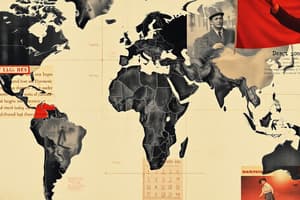Podcast
Questions and Answers
Under Article 10, when can a state be held responsible for the acts of an insurrectional movement?
Under Article 10, when can a state be held responsible for the acts of an insurrectional movement?
- When the movement assumes power and establishes itself as the new government. (correct)
- When the movement is acknowledged by the United Nations.
- When the movement is recognized by other states.
- When the movement fails and returns to its original state.
What does Article 11 allow regarding actions initially not attributable to the state?
What does Article 11 allow regarding actions initially not attributable to the state?
- The state may deny any association with those actions.
- The state may acknowledge and adopt those actions as its own. (correct)
- The actions must be renounced before being attributed to the state.
- The state is automatically held accountable regardless of its actions.
In the Tehran Hostages case, what caused the Iranian government to become responsible for the actions of private citizens?
In the Tehran Hostages case, what caused the Iranian government to become responsible for the actions of private citizens?
- Official endorsement and use of the actions for leverage. (correct)
- Public support for the hostages.
- International pressure from the United Nations.
- Media coverage encouraging government intervention.
What is required for a state to be responsible for aiding another state in committing an international wrongful act according to Article 16?
What is required for a state to be responsible for aiding another state in committing an international wrongful act according to Article 16?
Which of the following is NOT a consequence of wrongful conduct as per the ILC articles?
Which of the following is NOT a consequence of wrongful conduct as per the ILC articles?
Who generally has the right to invoke a breach of responsibility in international law?
Who generally has the right to invoke a breach of responsibility in international law?
Which of the following actions violates the principle of aiding another state in an international wrongful act?
Which of the following actions violates the principle of aiding another state in an international wrongful act?
What is indicated by the term 'erga omnes' in the context of breaches of responsibility?
What is indicated by the term 'erga omnes' in the context of breaches of responsibility?
What must happen for an insurrectional movement's acts to become attributed to the state according to Article 10?
What must happen for an insurrectional movement's acts to become attributed to the state according to Article 10?
Which of the following accurately reflects the responsibilities outlined in Article 11?
Which of the following accurately reflects the responsibilities outlined in Article 11?
What distinguishes the Tehran Hostages case in terms of state responsibility?
What distinguishes the Tehran Hostages case in terms of state responsibility?
According to Article 16, under what condition is a state internationally responsible for assisting another state in a wrongful act?
According to Article 16, under what condition is a state internationally responsible for assisting another state in a wrongful act?
What is one of the main obligations following a breach of responsibility according to the ILC articles?
What is one of the main obligations following a breach of responsibility according to the ILC articles?
Who typically has the authority to invoke a breach of responsibility in international law?
Who typically has the authority to invoke a breach of responsibility in international law?
Which situation illustrates a violation of international law regarding state responsibility?
Which situation illustrates a violation of international law regarding state responsibility?
In cases of erga omnes breaches, who can initiate legal proceedings?
In cases of erga omnes breaches, who can initiate legal proceedings?
Flashcards
State Responsibility for Insurrectional Movements
State Responsibility for Insurrectional Movements
A state can be held responsible for the actions of an insurrectional movement if the movement successfully establishes itself as the new government or forms a new state within the existing state's territory.
Subsequent Acknowledgement and Adoption
Subsequent Acknowledgement and Adoption
A state can be held accountable for actions it didn't initially authorize if it later acknowledges and adopts those actions as its own.
Tehran Hostages Case
Tehran Hostages Case
The Iranian government was held responsible for the seizure of the U.S. embassy and the taking of hostages by private citizens because it officially recognized and used these actions to its advantage.
State Responsibility for Aiding Wrongful Acts
State Responsibility for Aiding Wrongful Acts
Signup and view all the flashcards
Consequences of Wrongful Conduct
Consequences of Wrongful Conduct
Signup and view all the flashcards
Who Can Invoke a Breach of International Law?
Who Can Invoke a Breach of International Law?
Signup and view all the flashcards
Erga Omnes Obligations
Erga Omnes Obligations
Signup and view all the flashcards
Examples of Erga Omnes Obligations
Examples of Erga Omnes Obligations
Signup and view all the flashcards
Study Notes
State Responsibility for Acts of Insurrectional Movements
- States are responsible for acts of movements if they seize power or form a new state within a pre-existing state's territory, assuming subsequent adoption.
- Acts of insurrectional movements that haven't succeeded in establishing power aren't attributable to the state. This is a well-established principle.
Subsequent Adoption of Actions (Article 11 ILC)
- States can be held accountable for actions not initially attributable if they later acknowledge and adopt them as their own.
- Iran was held responsible for the embassy seizure and hostage-taking in the Tehran Hostages case because they endorsed these actions and used them against the US.
- A minister's statement acknowledging another's actions does not automatically equate to adoption. The example in the text rejects endorsement of wrongful acts, unlike the Tehran Hostages case where the government used the situation for their agenda.
State Responsibility for Aiding Another State in Wrongful Acts (Article 16 ILC)
- A state is responsible if it aids another state in an international wrongful act:
- with knowledge of the circumstances of the wrongful act, and
- the act would be wrongful if committed by the assisting state.
International Crimes and Wrongful Conduct
- Key International Crimes: crimes against humanity, right to self-determination, prohibition of apartheid & gross racial discrimination.
- Consequences of Wrongful Conduct: Primary obligations include ceasing the wrongful act and reparations.
Invoking Breaches of International Responsibility
- General rule: Only the injured party can invoke a violation.
- Exceptions: Erga Omnes breaches (like genocide) – everyone can invoke international law. Examples include South Africa, Israel and Gaza/Gambia and Myanmar.
- Applicable to: Genocide, Crimes Against Humanity, terrorism
Studying That Suits You
Use AI to generate personalized quizzes and flashcards to suit your learning preferences.




